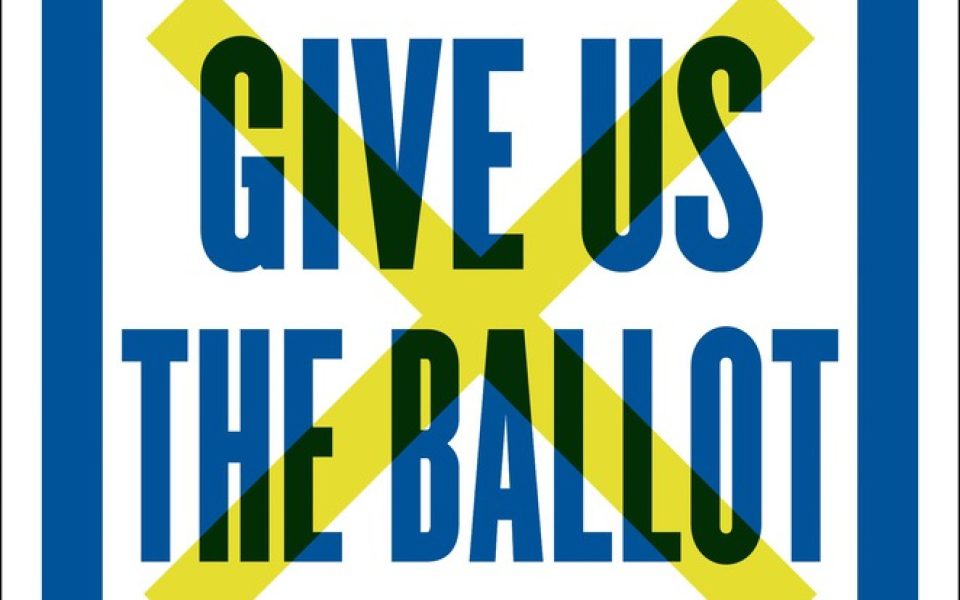Give Us the Ballot: The Modern Struggle for Voting Rights in America by Ari Berman, Farrar, Strauss and Giroux, 2015
It’s tempting to believe that after President Lyndon Johnson signed the 1965 Voting Rights Act the racist Southern lawmakers and local officials who had turned firehoses on activists had a change of heart and realized that disenfranchising black voters was wrong.
That frame is captured in the tableau of veteran civil rights activist and Congressman John Lewis, Peggy Wallace Kennedy — daughter of former segregationist governor George Wallace — and US Attorney General Eric Holder linking arms and singing “We Shall Overcome” during the 44th anniversary commemoration of Bloody Sunday in Selma, Ala. in 2009.
US Supreme Court Justice John Roberts seemed to subscribe to such a view — or else he was being deeply cynical — when he wrote in the notorious 2013 Shelby County v. Holder decision that “history did not end in 1965,” citing dramatic improvements in black representation and voter turnout over the past five decades.
But as Ari Berman, a political correspondent for The Nation, demonstrates in this fascinating and essential volume, the conservative response to the Voting Rights Act was at best a tactical retreat, with opponents like US Sen. Strom Thurmond of South Carolina strategizing to neutralize the law from the outset. Meanwhile, court battle by court battle, activists have used the law to improve black and Latino political representation and allow blacks to be elected to Congress in many Southern states for the first time since Reconstruction. As an example, the Supreme Court’s 1986 ruling in Gingles v. Thornburg struck down North Carolina’s multi-member state legislative districts as an unconstitutional scheme to dilute the black vote.
“As a result of the newly drawn single-member districts,” Berman writes, “the number of blacks in the state legislature increased from four in 1981 to nineteen in 1990.”
And despite efforts to roll back progress during the Reagan administration, Berman shows how voting rights advanced during the administration of George HW Bush through an unlikely coalition of civil rights groups and the Southern GOP, resulting in the creation of majority-black congressional districts in states such as North Carolina — increasing black representation while giving Republicans a better opportunity to compete in adjacent districts with whitened populations.
And he shows how a concerted effort to restrict voting rights gathered force even before the election of the second Bush to the presidency with an aggressive purge that removed thousands of voters who were wrongfully identified as felons, resulting in a finding of “widespread voter disenfranchisement” by the US Civil Rights Commission. While the Justice Department under President George W. Bush shifted its focus from protecting voting rights to detecting mostly phantom voter fraud, Bush would sign the reauthorization of the Voting Rights Act in 2006. Berman posits that Republican lawmakers supported reauthorization to avoid alienating black voters as they sought reelection after the stain of federal abandonment in the aftermath of Hurricane Katrina.
The courageous determination of civil rights workers who faced bloody state suppression in Selma, shocking the nation’s conscience and spurring the passage of the VRA, comes full circle in Berman’s book with the rise of the Moral Monday movement in North Carolina in 2013. Chief Justice Roberts’ observation that history did not end in 1965 finds an ironic coda when North Carolina state Sen. Tom Apodaca announced on the day of the Shelby ruling: “Now we can go with the full bill.” The Republican majority in the state General Assembly would go on to pass what is widely regarded as the most restrictive election law in the nation.
Earlier this month, the Fourth Circuit Court of Appeals issued a stay against two of the provisions of North Carolina’s new election law — same-day registration during early voting and out-of-precinct voting — so that they will be in place for the November election. Meanwhile, the US Supreme Court — which will undoubtedly make the final call on the law — remains split down the middle with the Republican-controlled Senate’s refusal to confirm President Obama’s appointment to replace the late Justice Antonin Scalia. Give Us the Ballot then serves as an excellent preview for the next significant phase of voting-rights history.
- A moment with Whitney
- Midnight Bowling by Quinn Dalton, Carolina Wren Press, 2016
- Revolutionize Now: Creative Leadership & Action for Social Change by Jada Monica Drew, self published, 2016
- Trespassing Across America: One Man’s Epic, Never-Done-Before (and Sort of Illegal) Hike Across the Heartland by Ken Ilgunas, Blue Rider Press, 2016
- Naked DJ by Jo Maeder, Vivant Press, 2016
- F**K IVY **and Everything Else by Mark McNairy, Harper Design, 2016
- Daily Motivation: 365 Messages to Inspire You at Work and in Life, by Nido R. Qubein, Simple Truths, 2016
- Notable books with local connections
Join the First Amendment Society, a membership that goes directly to funding TCB‘s newsroom.
We believe that reporting can save the world.
The TCB First Amendment Society recognizes the vital role of a free, unfettered press with a bundling of local experiences designed to build community, and unique engagements with our newsroom that will help you understand, and shape, local journalism’s critical role in uplifting the people in our cities.
All revenue goes directly into the newsroom as reporters’ salaries and freelance commissions.


Leave a Reply